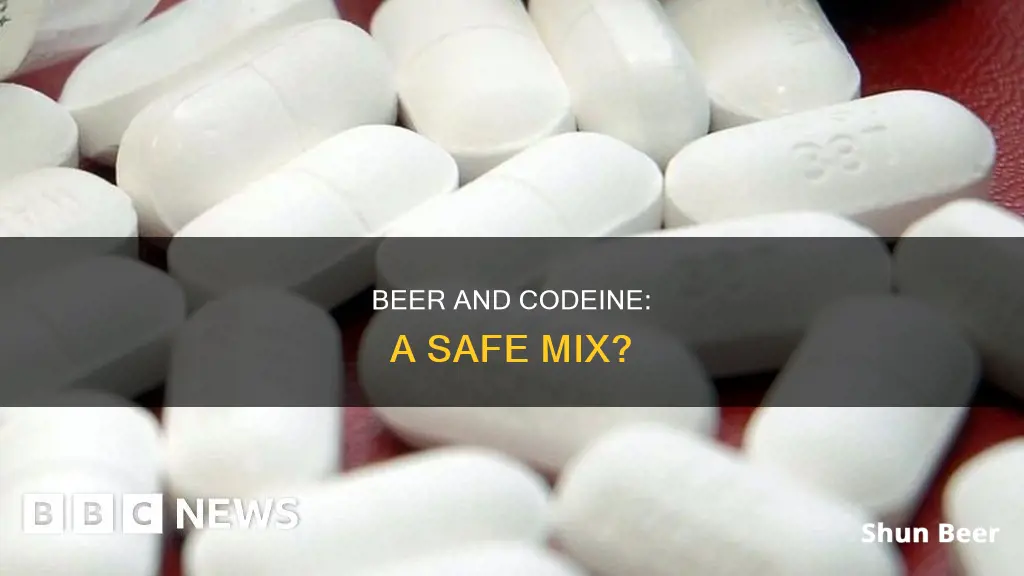
Mixing low-alcohol beer with codeine is not safe. Both substances are central nervous system depressants, which means they have a sedative effect when taken. This effect is intensified when they are combined, leading to heightened drowsiness and fatigue, impaired motor skills, cognitive dysfunction, and gastrointestinal issues. Mixing codeine and alcohol also increases the risk of accidents, such as falls and car crashes, and can lead to respiratory depression and even death.
| Characteristics | Values |
|---|---|
| Safety | It is not safe to mix low-alcohol beer with codeine |
| Reasons | Both substances are central nervous system depressants, which can lead to a heightened sense of relaxation and pleasure. |
| Side Effects | Extreme drowsiness, fatigue, dizziness, impaired motor skills, cognitive dysfunction, gastrointestinal issues, respiratory depression, coma, and even death. |
| Treatment | Medical detox, inpatient care, and outpatient treatment are available for those struggling with an addiction to codeine, alcohol, or both. |
What You'll Learn

The dangers of mixing codeine and alcohol
Mixing codeine and alcohol is extremely dangerous and can lead to a range of adverse health effects and even death. Both substances are central nervous system depressants, and when combined, they exaggerate each other's effects. This intensifies the intoxication experienced by the user, increasing the risk of overdose and long-term health damage.
The Effects of Mixing Codeine and Alcohol
Codeine is a prescription opioid painkiller and cough suppressant, while alcohol is one of the most commonly used drugs worldwide. When mixed, these substances can cause a range of side effects, including:
- Extreme drowsiness or fatigue
- Dizziness
- Lightheadedness
- Trouble concentrating
- Fainting
- Impaired thinking and judgment
- Delayed motor skills and reaction time
- Respiratory distress
- Low blood pressure
- Coma
- Brain injury
- Death
One of the most significant dangers of mixing codeine and alcohol is the risk of severe respiratory depression. This causes irregular breathing, reducing the amount of oxygen that reaches the brain and other vital organs. This oxygen deprivation can lead to long-term damage to major organ systems and even death.
Additionally, mixing codeine and alcohol increases the risk of liver and kidney damage. It can also cause gastrointestinal issues such as abdominal bloating, inflammation, ulcers, indigestion, and malnutrition.
The combination of these substances can also lead to impaired judgment, making activities such as driving extremely risky.
Treatment for Codeine and Alcohol Addiction
Mixing codeine and alcohol can quickly lead to addiction and overdose. Treatment for this addiction typically involves detoxification, followed by inpatient or outpatient rehabilitation. Detoxification involves gradually reducing the doses of both substances to mitigate withdrawal symptoms. Inpatient treatment involves staying at a residential facility with 24/7 care and monitoring, while outpatient treatment allows the patient to live at home while attending therapy and support groups.
It is crucial to seek professional help if you or someone you know is mixing codeine and alcohol.
Women Beer Drinkers: Exploring Preferences and Trends
You may want to see also

Short-term effects of mixing codeine and alcohol
Mixing codeine and alcohol can have severe short-term effects, even if consumed in small amounts. Both substances are central nervous system depressants, which means they have a sedative effect when taken. This effect is intensified when the two are combined, leading to heightened drowsiness and fatigue. Users may experience overwhelming tiredness, impaired alertness, and difficulty staying awake.
The combined use of codeine and alcohol can also lead to impaired motor skills and delayed reaction times, posing a greater risk of falls and accidents. Tasks requiring coordination, such as driving, become more hazardous. Additionally, users may experience cognitive dysfunction, including difficulty concentrating and compromised decision-making abilities.
Another short-term effect of mixing codeine and alcohol is gastrointestinal issues, such as stomach irritation, nausea, and vomiting. This can contribute to dehydration and electrolyte imbalances. Both substances can also lead to memory deficits when combined, making it difficult to recall events during the period of intoxication.
It is important to note that even small amounts of codeine and alcohol can interact and produce these short-term effects. Therefore, it is crucial to be aware of the potential risks and side effects of mixing these two substances.
Beer and Pantoprazole: Is It Safe to Drink?
You may want to see also

Long-term effects of mixing codeine and alcohol
Mixing codeine and alcohol can have severe long-term effects on the body and brain. Both substances are central nervous system depressants, which means that when combined, they create a synergistic effect, intensifying the overall impact on the body and mind. This can lead to a heightened sense of relaxation and pleasure, but also to dangerous levels of intoxication.
The enhanced euphoria and sedation caused by mixing codeine and alcohol can result in respiratory depression, which reduces the amount of oxygen circulating throughout the body. This puts the user at risk of long-term organ damage, including kidney disease, liver damage, brain damage, and even death. Mixing the two substances also increases the risk of accidents, such as falls and car crashes, which can result in broken bones or head injuries.
Prolonged use of codeine and alcohol can also have long-lasting psychological effects. The interaction between the two substances can disrupt the delicate balance of neurotransmitters in the brain, leading to unpredictable mood swings, anxiety, and depression. Additionally, the addictive properties of both codeine and alcohol can compound their impact on mental health, making it challenging for individuals to maintain a consistent and positive mental state.
Chronic misuse of codeine and alcohol can lead to tolerance, requiring higher doses to achieve the same effects. This can result in a potentially lethal cycle, as users may continue to increase their dosage, putting them at an even greater risk of a fatal overdose.
Gluten Allergy and Beer: What's Safe to Drink?
You may want to see also

How to avoid accidentally mixing codeine and alcohol
Mixing codeine and alcohol is extremely dangerous and can lead to a range of negative health outcomes, including overdose and death. Here are some detailed instructions on how to avoid accidentally mixing codeine and alcohol:
- Stay Informed: Educate yourself about the potential interactions, risks, and side effects associated with mixing codeine and alcohol. Understanding the dangers can help you make informed decisions and avoid unintentional mixing.
- Follow Healthcare Provider's Guidance: Always adhere to the instructions and warnings provided by your doctor or healthcare provider. If you have been prescribed codeine or any other medication, discuss its compatibility with alcohol. Follow the recommended dosage and timing, and don't hesitate to clarify any doubts or concerns with your healthcare professional.
- Monitor Your Consumption: Be mindful of your alcohol and codeine consumption. Avoid impulsive or excessive use of either substance. Practice moderation and be aware of your limits.
- Open Communication with Healthcare Providers: Ensure clear and open communication with your doctors or healthcare providers. If you are prescribed codeine or any medication, be transparent about your alcohol consumption habits. Provide accurate information about your lifestyle and habits to enable them to offer relevant advice and precautions.
- Medication Labels and Packaging: Pay close attention to medication labels and packaging. Look for warnings regarding alcohol consumption while taking the medication. If the information is unclear or you have doubts, consult your pharmacist or healthcare provider. Don't assume it's safe to consume alcohol without verifying the risks associated with the specific medication.
- Seek Help if Needed: If you or someone you know is mixing codeine and alcohol, consider seeking professional help. Addiction to either substance can develop, and specialised treatment programs are available to support recovery.
By following these guidelines, you can significantly reduce the risk of accidentally mixing codeine and alcohol, thereby protecting yourself from the harmful effects of this dangerous combination.
Why Bottled Beer Is a No-Show in Movies
You may want to see also

Treatment for codeine and alcohol addiction
Mixing codeine and alcohol is extremely dangerous as the mixture intensifies the effects of both substances, increasing the risk of overdose and long-term health damage. The combined sedative effect of codeine and alcohol can also increase the risk of accidents, such as falls and car crashes. Therefore, it is important to seek professional help if you or someone you know is struggling with codeine and alcohol addiction.
Medical Detox
Due to the addictive nature of both codeine and alcohol, it is recommended that individuals going through withdrawal from these substances do so in a medical setting with 24-hour care. This helps to ensure the safety and comfort of the patient. During medical detox, individuals are monitored around the clock, and medications may be used to manage withdrawal symptoms. It is important to address any complications and evaluate patients for other medical conditions.
Rehabilitation
After detox, individuals should engage in an inpatient or outpatient rehabilitation program. This can be a dual-diagnosis program that addresses both the codeine and alcohol addiction. Rehabilitation provides a structured environment where individuals can focus on their recovery and develop strategies to avoid relapse.
Therapy and Counselling
As part of a comprehensive treatment plan, individuals may participate in group therapy, individual counselling, and family counselling. These sessions can help address the underlying causes of addiction, improve coping mechanisms, and provide ongoing support during recovery.
Support Groups
In addition to therapy and counselling, attending support group meetings can be beneficial. Connecting with others who are going through similar struggles can provide a sense of community and ongoing support during the recovery journey.
Medication Management
In some cases, medications may be prescribed as part of the treatment plan. These medications can help manage withdrawal symptoms and address any co-occurring mental health conditions. It is important to work with a medical professional to ensure the safe and effective use of medications.
Long-Term Support
Recovery is an ongoing process, and it is important to have long-term support in place. This may include ongoing therapy, support group participation, and regular check-ins with a medical professional. Additionally, making lifestyle changes, such as improving diet, engaging in physical activity, and finding healthy coping mechanisms, can support long-term recovery.
It is important to remember that recovery is a journey, and it may involve setbacks and challenges. Seeking professional help and creating a strong support system can increase the chances of successful, long-term recovery from codeine and alcohol addiction.
Beer Benefits: Why Drinking Beer is Good for You
You may want to see also
Frequently asked questions
No, it is not safe to mix low-alcohol beer with codeine. Both substances are central nervous system depressants, which means they have a sedative effect when taken together. This can lead to a heightened sense of relaxation and pleasure, but it can also cause dangerous side effects such as drowsiness, dizziness, trouble breathing, impaired thinking and judgment, and delayed motor skills. Mixing codeine and alcohol can also increase the risk of accidents, such as falls or car crashes, and can lead to respiratory depression, which can be fatal.
Mixing low-alcohol beer with codeine can cause a range of dangerous side effects, including extreme drowsiness or fatigue, delayed motor skills and reaction time, respiratory depression, fainting, coma, and even death. It can also increase the risk of accidents and long-term health damage, such as liver and kidney damage, gastrointestinal issues, and addiction.
If you have consumed a small amount of codeine and low-alcohol beer, there is generally no cause for concern. However, it is important to monitor yourself for any signs of an overdose, such as extreme drowsiness or difficulty breathing. If you have consumed a large amount of both substances, seek immediate medical attention as the combination can have delayed and progressively worsening effects, including life-threatening complications. Be transparent with healthcare professionals about the amount you have consumed to ensure an accurate diagnosis and prompt intervention.







